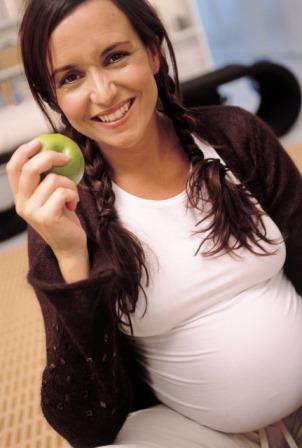Eating a healthy, balanced diet is even more crucial when you’re pregnant – for you and your baby. Here’s what you need to know…
When you see that positive on the pregnancy test, you don’t suddenly need to go on a special diet. Barring a few exceptions, pregnancy food is the same as the stuff you normally put on your plate. But it is important to go for a variety of different foods each day so that you and your baby get a balance.

Here are some basic dietary guidelines:
See the NHS Eating Well Guide for more info. You also might be eligible for free milk, fruit, vegetables and vitamin supplements through a government scheme called Healthy Start.
Check out our article about which vitamins you need to supplement in pregnancy. For a guide on which foods to avoid when pregnant, head here.
No matter what your auntie Joan tells you, there’s no need to eat for two when pregnant, even if you’re expecting multiples. Pregnant women need just 200 extra calories and even that is only in the last trimester.
As a guide, a tablespoon of olive oil, a small matchbox-sized piece of cheese or a banana are all 100 calories.
There’s no doubt about it, morning sickness can genuinely affect your day-to-day life. Plus, how much food you’re managing to keep down – and what type.
For example if all you can stomach is toast, this might make you panic but don’t worry: morning sickness doesn’t put your baby at any increased risk. Morning sickness usually clears up by weeks 16 to 20 of your pregnancy.
If you can’t keep any food or drink down, this could be a symptom of a severe form of morning sickness called hyperemesis gravidarum. This affects around 1% of pregnant women. It can be serious, and there’s a chance you could become dehydrated or malnourished from it.
Pregnant women need just 200 extra calories, and only in the last trimester
Contact your GP or midwife immediately if you:
For useful information on pregnancy sickness and coping strategies, please see the Pregnancy Sickness Support website.
Incorrect. You can stay veggie or vegan when you’re expecting. You’ll just have to work harder to make sure you get the nutrients you need for you and your baby.
The main issue for vegetarian and vegan mums-to-be is that you get enough iron, vitamin B12 and vitamin D (all mainly found in meat and fish). If you are vegetarian or vegan, talk to your midwife or doctor about how you can get all the nutrients you need.
Some good advice for vegetarians for starters includes:
Our support line offers practical and emotional support with feeding your baby and general enquiries for parents, members and volunteers: 0300 330 0700.
We also offer antenatal courses which are a great way to find out more about birth, labour and life with a new baby.